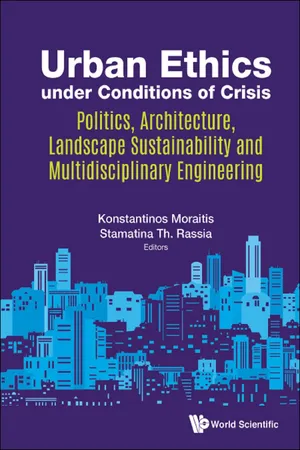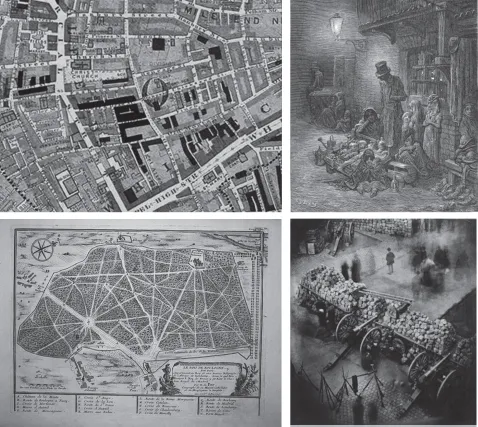![]() Theory & History
Theory & History![]()
Chapter 1
Informal Ethics, Ethics of Transformation: Political and Landscape Urbanity
Konstantinos Moraitis
Architect – Engineer, Professor, School of Architecture,
National Technical University of Athens
8A Hadjikosta Str., Athens 11521, Hellenic Republic
[email protected] If planning and design of the city, of ‘polis’ seem to be crucial for the existence and moreover for the control of social formation, thus crucial for social ethics, then the recent interest of planners and urban designers as well as of state administration for ‘informal’ urbanism, must be appreciated as surpassing restricted technical approaches. It rather indicates new political tendencies and, furthermore, a general epistemic reversal concerning scientific tendencies and social ethics in general.
Our essay will try to investigate the lineage of this general cultural orientation, clearly recognizable by now, and to correlate it with the ‘animate’ landscape feeling invigorating our present urban and architectural design approaches. Interest for the detection of movement and transformation may be noticed as early as in 17th century and though largely suppressed by the predominance of Euclidean rationalism, it reappeared again, a century later, characterizing a new age of revolutionary political turbulences and revolutionary epistemological ruptures. It is in the same way that we may evaluate present conditions, discussing scientific approaches as topological mathematics and computational mechanics, or contemporary political controversies; all of them in possible correlation to the social and material structure of our cities and thus to contemporary urban ethics.
1.Introductory remarks: Interest for transformation processes and informality, as correlated to contemporary epistemic identity
If planning and design of the city, of ‘polis’ seem to be crucial for the existence and moreover for the control of social formation, thus crucial for social ethics, then the recent interest of planners and urban designers as well as of state administration, for ‘informal’ urbanism, must be appreciated as surpassing restricted technical approaches. It would be rather obvious to insist on the political importance of this new state of reference, to speak about a differentiation of our political attitudes; in addition, what we shall rather try to prove, is that this recent change of urban strategies corresponds to a broader change of our appreciation, concerning the possibilities of cognition and the possibilities of control over natural and social reality.
In a broader sense, interest for ‘informality’ should be regarded as indication of a general epistemic reversal that began taking place at least as early as the end of 18th century, to continue its development for the following, 19th and 20th, centuries. ‘At least as early’, because we could even detect this stream of inquiry during the second half of 17th century, being correlated to Gottfried Wilhelm Leibniz’s philosophy and scientific proposals, concerning a feeling of the universe animated by an inner force and thus subjected to transformation.
A first important introductory remark could focus on the ethical and political significance that the previous Leibnizian epistemological proposition acquired in the course of Western history. Was the idea of a universe characterized by inner forces of transformation associated to the possibility and moreover to the demand of social and political change? A second important introductory remark could refer to the feeling that contemporary societies seem to have reached, by now, the peak condition of the previous epistemological and cultural interest for transformation, of its influence on scientific theory, applied sciences and representational techniques as well. Does the above scientific development coincide with a parallel ethical re-evaluation, with the positive acceptance of the inevitable change, the inevitable transformation, moreover with the positive acceptance of what exists outside conventional control, of what could be described as ‘informality’?
We could present the previous generalized scientific and cultural condition, this appreciation may lead to a third introductory remark, as possessing a crucial ‘epistemic’a value, as describing the general scientific and cultural context, the contemporary historical a priori, out of which knowledge in our historic era and its discourses emerge. In our presentation we shall try to associate this contemporary ‘epistemic’ condition to the way we conceptualize urbanity, contemporary planning and design of cities. At a larger scale of reference, we shall ascribe to this contemporary ‘epistemic’ condition a generalized ethical halo, characterizing in many ways our contemporary state of social existence.
2.Insisting on social transformation processes and social informality
We shall repeat that the theoretical acceptance of informality, the acknowledgment of the fact that total, centralized control of reality, natural reality or social reality seems to be inapplicable in an absolute way, may lead to a number of ethical consequences.
In accordance to the previous lack of centralized controlling power, we ought to accept changes in our social environment; we must attain a state of adaptability of opinion, of tolerance towards what is not completely conditioned by accepted and established rigid criteria. We could describe this social realization through the metaphor of naval architecture, having to face ship structures in an environment of continuous dynamic change, in contradiction to building construction having to address conventional, immovable earth conditions. We could even present social reality, metaphorically, as a vessel under dynamic transformation, transmitting the qualities of the social ‘body’ under transformation to urban environment. We may even metaphorically compare social condition and urbanity to the real biological bodies, whose ‘animate’ morphogenetic changes were described by D’Arcy Wentworth Thompson in his pioneer proposal of mathematical biology, in his On Growth and Form theoretical contribution [Thompson, 1945]. At a political level this metaphor roughly means that absolute ‘top-down’ procedures of governance are in essence inapplicable on full scale, being constantly disturbed by social change.
In Western past, formalized, centrally created civilization had to be nourished by a larger, loosely controlled, partly informal or even uncontrolled periphery, often neglected by official historiography. However peripheral pressures did exist, whereas in critical instances they even momentarily conquered the stage of history.
3.A pilgrimageb to late medieval Paris and 19th century European metropolises
Victor Hugo vividly describes a parallel hidden society in late Middle Ages Paris, composed by marginalized population, by gypsies, beggars and outlaws, consisting ‘le Cour des Miracles - the Court of Miracles’; a name used to describe the unprivileged slum Parisian districts and their inhabitants. The romantic imagery of the author presents, in his Notre-Dame de Paris-1482, English title Hunchback of Notre-Dame, this counter-society existing side by side with the medieval architectural monument of the religious ‘canonical’ formality; side by side with Notre-Dame.
We do not need romantic imageryc in order to agree that miserable conditions persisted in Western metropolises for centuries, at the antipodes of the prominent official Western identity. Bourgeois social research, as the one presented in Charles Booth’s Maps of Povertyd, or arguments insisting on radical social reform, as those presented in Friedrich Engels’ The Condition in the Working Class in England [2005], both acknowledged that impoverished parts of European cities, as in the previous cases in Britain, existed in 19th century feeding the demand for political change and even more for revolutionary subversion. However it is again in Victor Hugo’s fiction that we find out the literary metaphor, transmitting social confrontation and ethical dilemmas under the city, in the dark informality of the Parisian sewers; typical legality or personal, informal re-evaluation of justice? In his famous historical novel Les Misérables-The Miserable Ones, the June Rebellion of 1832 in Paris is clearly described. In this masterpiece of romantic modernity, a constant negation of conventional ethical approaches continuously appears, correlated to the formation of the city, at earth level or underneath, on controlled public space or on the barricades. In this narration, one of the ‘longest ever written’, the reader has to choose between ‘evil and good, injustice and justice, falsehood and truth’, projecting his ethical indecision on the mixed scenography of Paris, partly modern and at the same time still largely medieval, guarding in its early 19th century formation the urban and social informality of previous ages.
Images 1-4: The ‘condition of the impoverished urban population’ in the 19th century European metropolises, in comparison to the centralized ‘top-down’ urban rehabilitation processes and to the promise for green urban ‘Arcadias’.
Image 1: Charles Booth’s Maps of Poverty (1889). Grey parts of London are characterized as secure enough, ‘well to do’, while the black parts as ‘semi-criminal’. Image 2: A pilgrimage to London, by Gustave Doré (1872), depiction of the dark side of the city. Image 3: Le Bois de Boulogne, the urban park of the wood of Boulogne, as reformed during the urban interventions by Georges-Eugène Haussmann (1853-1870), under the governance of emperor Napoleon III… Image 4: The Commune de Paris barricades, during the Parisian revolution of 1871, which was not prevented by the Hausmannian urban reform of the French capital.
Parisians of the late 19th century would have to wait for emperor’s Napoléon III and Georges-Eugène Haussmann’se intervention, between 1853 and 1870, in order to live in a modernized controlled city. The Hausmannian renovation of Paris had not only to do with the need of facing unsupportable conditions of housing and the continuous spread of infectious diseases, as the two cholera epidemics that ravaged the French capital in 1830 and 1848. It had also to manage social antitheses and help to eliminate, if possible, or at least control political instability. It was during the same period, between the two cholera incidents in 1830 and 1848, that seven armed uprisings and revolts had broken out in Paris; the center of the city being a cradle of discontent and revolution [Maneglier, 2009].
4.Back to contemporary experience
Coming back to contemporary experience, we could indicate that marginalization of social groups could be proved not only undemocratic, but also insecure for political normality. Radical differentiation constitutes, for many centuries, a ‘structural’ strategic practice for developed countries, exerted as part of their interior as well as of their exterior colonizing policy. It made possible the accumulation of economic and politic power; even though it was characterized by serious disadvantages, as it caused a political environment of confrontation and, in the interior of national borders, a serious damage of social coherence, as the one recently reappeared at the heart of European democracy.
It is in the context of this recent political controversy that marginalized or ‘peripheral’ social groups of differentiated religious, cultural and ethnic identity, feeling that their political and economic participation in their European place of living is neglected, seek a violent presence, or at least express an attitude of protest and confrontation. If we repeat the previous description and pronounce it in a more sophisticate way, we may state that the initial informality of those communities, the unresolved problem of their participation to the economic, political and cultural formal procedures, had produced an even more extended informality. The crucial quest refers to the possible resolution of these contradictions, reaching by now, in many cases, the condition of the armed terrorism. Could those contradictions between different social groups be completely resolved, through a ‘top-down’ authoritarian way of ‘zero tolerance’? Or, should we re-form our contemporary societies, in a more resilient way, being prepared to continuously re-approach its goals, t...

